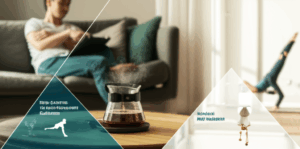Actor and comedian Seth Rogen recently underscored the critical role of meaningful connections in maintaining good mental health, advocating for deliberate efforts to combat isolation in an increasingly technological world. His comments highlight a growing awareness among public figures about the importance of genuine human interaction for overall well-being.

The Perils of Isolation in the Digital Age
Speaking about the subject, Rogen pointed to the ease with which individuals can become isolated today, attributing it in part to the pervasive nature of technology. He noted that it’s “very easy to feel like you’re having kind of meaningful connections with people that literally might not even be real people,” citing an anecdote about someone in a relationship with an AI chatbot. This observation emphasizes a contemporary challenge where virtual interactions can sometimes substitute for, rather than supplement, authentic human bonds.
Rogen urged individuals to actively resist the gravitational pull of isolation. “I think you’ve got to purposely pull yourself out of it, or gravity will pull you into it, you know?” he stated. He contrasted this with his own lifestyle, which often keeps him out of the house and engaged, acknowledging that it’s easy for others to fall into patterns of inactivity.
The Importance of In-Person Interaction
While technology offers avenues for connection, Rogen believes that being around “actual people” and engaging in real conversations is ultimately more beneficial. He stressed the value of going “out in the world and do things” with others. This perspective resonates with broader discussions about the impact of screen time and digital communication on social skills and mental health.

Seth Rogen’s Broader Advocacy for Brain Health
Rogen’s recent statements align with his ongoing commitment to mental and brain health advocacy, particularly through his organization Hilarity for Charity (HFC), which he co-founded with his wife, Lauren Miller Rogen. The organization was established following Lauren’s mother’s early-onset Alzheimer’s diagnosis. HFC aims to support families affected by Alzheimer’s, raise awareness, and educate younger generations about brain health.
Hilarity for Charity: Promoting Preventative Measures
Hilarity for Charity actively promotes five key brain health habits, which the Rogens integrate into their daily lives: sleep, nutrition, exercise, emotional well-being, and keeping the brain active by learning new things. These habits are championed as crucial preventative measures, with research suggesting that up to 40% of dementia cases might be preventable through lifestyle choices. The organization has even enlisted celebrities to teach brain health courses, based on studies indicating that people learn better from famous personalities than from doctors.
Rogen and his wife have been open about their personal routines, including a competitive approach to tracking their sleep, highlighting its importance for brain health. They also engage in activities like pottery together to stay mentally fit.

The Impact of Criticism on Mental Health
Beyond social connections, Rogen has also candidly discussed the mental health impact of external pressures, specifically negative criticism in his profession. He has stated that negative reviews can be “devastating” for artists, expressing that if critics understood the depth of the hurt caused, they might reconsider their approach. Rogen has admitted that such criticism can be very personal and lead to long-lasting pain for filmmakers. His experience with films like “The Green Hornet” and “The Interview” particularly highlights how creative failures can feel like personal attacks.
In conclusion, Seth Rogen’s recent remarks serve as a poignant reminder that in an increasingly digital and often isolating world, fostering meaningful, in-person connections is not just a social nicety but a fundamental requirement for mental well-being. His advocacy through Hilarity for Charity further underscores his dedication to promoting overall brain health through practical, accessible habits.







